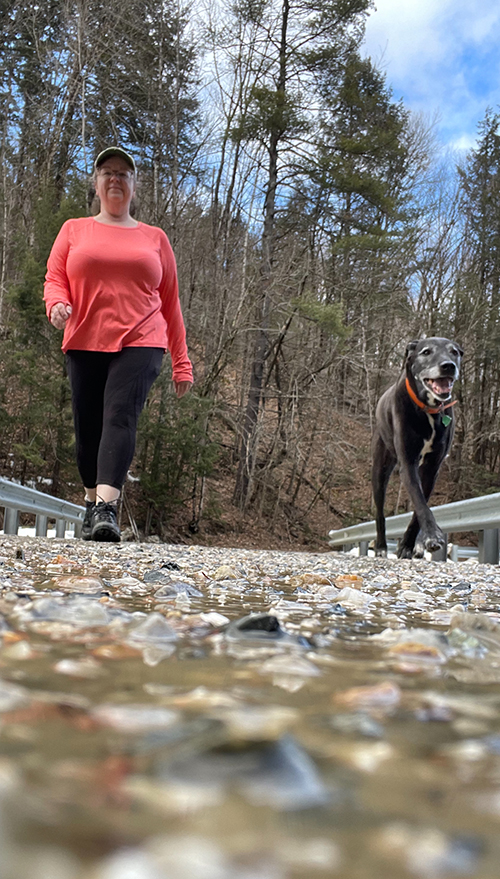
My Journey to Health After 50
In this post, Gifford staffer Karen Ruben shares her personal reflections on getting fit after age 50. If you don’t currently exercise, and want to start, check with your provider who can advise whether a new routine is safe for you, especially if you are unsteady on your feet or have a chronic health condition.
By Karen Ruben
It was one of those profound moments that you can’t shake off—a moment that made me question how I could have ignored the glaring signs for so long. What should have been obvious was something my mind had blocked me from seeing for myself. Until, in that moment, lying there, watching the rhythmic beat of my heart on the monitor, every breath I took echoed the urgency of my situation. At 50, the impact of years neglecting my diet and exercise was stark and undeniable. It couldn’t have been more obvious. It was time for a change.
I had drifted through life with a carefree disregard for nutrition and exercise. Life had been a whirlwind of soda over water, pies over fresh fruit, and movies over movement. My body tried to warn me, through shortness of breath, erratic heartbeats, and unexplained aches, that ignoring the basics of health was not without consequences. But I wasn’t listening—until that day.
The Wake-Up Call
Seeing my heart work in real-time, its every beat a struggle, was my wake-up call. Here I was, a woman just turning 50, wrestling with the chaotic twists of menopause and the added stress of obesity. It was time to take control.
A friend introduced me to a virtual walking group. Inspired, I took on a metaphorical climb from the base to the summit of Mt. Everest—40 miles that started with the hardest mile of my life. That first mile took over half-an-hour, but with each step I chanted, “One foot in front of the other,” over and over again. This mantra wasn’t just about physical movement; it symbolized a mental step forward in my life.

Transformation One Step at a Time
Gradually, as I walked, my lifestyle began to align with my goals. I embraced nutrition and hydration, critical not just for weight loss but also for managing menopause symptoms. “It’s up to me,” became my new rallying cry—a declaration that taking charge of my health was ultimately my responsibility and mine alone.
The Benefits of a Daily Walk
I soon began to realize that, among making other necessary changes, committing to just a 20-minute walk each day can truly be transformative. Benefits include:
- Enhancing cardiovascular health: Reducing the risk of heart disease, especially critical during menopause.
- Improving mood: Combating menopausal anxiety and depression with natural endorphins.
- Strengthening bones: Fighting against osteoporosis, which accelerates after menopause.
- Boosting metabolic rate: Helping with weight loss, which can be challenging during this hormonal transition.
Taking control of your health after 50 isn’t just possible; it can be your next great adventure. If you’re at a similar crossroads, facing menopause, managing weight, or juggling a busy life, remember: It’s never too late to start. A simple daily walk can be your first step toward a healthier, more energetic life. I’ve learned that managing health is not just a necessity but an opportunity—an opportunity to live vibrantly, embrace challenges, and enjoy every step of the journey. Spring is here, making it the perfect time to get out there and “put one foot in front of the other.”
What step will you take today to start your journey toward a healthier tomorrow?
###

